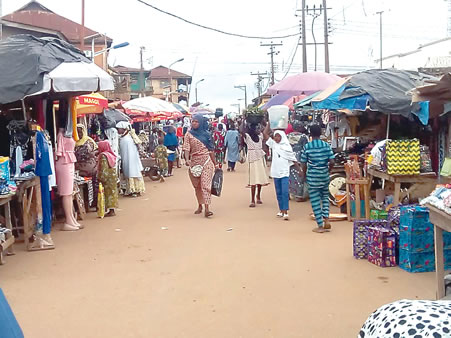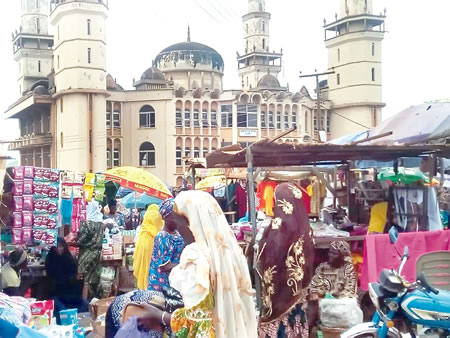Every Saturday is special for trade and commerce in Ejigbo town, an agrarian community in Ejigbo Central Local Government Area of Osun State. On these days, the popular Ogiyan Market opens to a large crowd of traders who come from far and near to buy and sell.
The weekly routine typically begins on Friday nights when trucks laden with tons of various farm produce, farming implements and other articles of trade mainly from Ivory Coast such as kitchen utensils, textile (especially Ankara Abidjan), shoes and decours arrive at the ancient town.
By daybreak, the market is set. And, as early as 7:00am on market days, transactions would have begun in earnest. Buyers and sellers from neighbouring communities and from faraway would have converged on the market which spreads from Olaiya area of the town to the palace of the Ogiyan of Ejigbo down to the Central Mosque and extending into nearby streets and compounds.
For six days, activities usually ebb in the community, but the town naturally comes alive on the market days as commerce mix seamlessly with social life. The natives seize the opportunity to sell local wares and delicacies.
Some regular callers at Ejigbo sometimes look out for next opportunity to eat Ancheke, an Ivorian meal and wash it down with some gulps of Lekaye degee, an Ivorian indigenous wine which is now commonly brewed in Ejigbo.
The market day also opens a rare window of business opportunity to some natives who rent out rooms from their shelter and as warehouse and to accommodate traders who may want to stay overnight and travel back to their stations the next day (on Sunday), because they cannot make it back on the market day.
Apart from having the opportunity to buy wares that are imported from Ivory Coast at the Ogiyan Market, merchants from neighbouring communities like Ede, Osogbo, Awo, Iwo, Gbogan etc. sometimes seize the advantage to inquire about and explore business opportunities in Ivory Coast. Some of them book transportation to Abidjan from Ejigbo using the links that they had built on the market day.
To the Ogiyan of Ejigbo, Oba Omowonuola Oyesosin, Ivory Coast means more than a trade destination to Ejigbo indigenes. Putting it in the language of the Iyaloja of Ejigbo, Chief Janet Oguntola, “Ivory Coast is the economic pot of the people of Ejigbo.” Just as the natives tap from the abounding economic benefits in the Francophone country, Saturday Tribune gathered that some Ivorians also prospect greener pastures in Ejigbo.
The symbiotic relationship has promoted the economy of the agrarian Nigerian community just as it places it on the map of Osun State as a frontline trading centre.
On hand at the Ogiyan Market are bureau-de-change operators who change Ivorian CFA and pound sterling to naira. Asked if the Ivorian currency is acceptable as a medium of exchange in Ejigbo market, Chief Oguntola, said: “Traders don’t take West African CFA franc instead of naira.
“Those changing CFA to naira are there because we have a lot of our people in Ivory Coast as a result of the agelong relationship and regular interaction that we have with Ivory Coast. Our people are there and we buy different articles of trade from the country,
“Sometimes, some of our people who are based in Ivory Coast send money home to their family members to address some needs. Also, some of our people who just returned from the country may have some CFA that they want to change. That is the reason why we have people who change currencies in Ejigbo.”
The NURTW Secretary, Ejigbo International unit, Evangelist Ayodele Balogun, said: “We take both naira and CFA for the fare. In the past when we take passengers to Ivory Coast we usually return two weeks after, but now we return the third day. We travel to Abidjan twice a month. We operate luxurious buses with 70-passenger capacity. We take CFA35,000 (N19,000) for buses without air conditioner while we take CFA45,000 (N27,000) for buses with air conditioner.”
The Iyaloja said that many people like to patronise Ejigbo market despite its remoteness and the rough roads because products in the market are comparatively cheaper than places elsewhere. “Imported products from Abidjan are strong, unique and cheap. Our farmers bring food crops such as maize, yam, cassava and palm wine. Apart from food crops, the farmers also cultivate cocoa, kolanut and oil palm.”
Stressing the importance of peace to the growth of trade in Ejigbo, she said: “We harp on peace and unity in the market because without peace people won’t come. As the head of the market, I brought myself to the level of the traders and I settle rifts amicably among them.
“The challenges that we have in the market are lack of toilets facilities, lack of hygienic water and absence of modern lock-up shops. We appeal to the Osun State government to come to our aid by building us a market with modern facilities.”
She recalled that in the past, crime rate was high in the town, saying that many traders had run into debt. She said that a woman some time ago ran into huge debt when some hoodlums looted her shop second day after stocking. “The robbers carted away everything in her shop. She nearly killed herself.
“I had similar experience on three different occasions when my shop was looted by robbers. But, that has stopped. We now have peace and the traders are happy. God has taken charge.”
Oba Oyesosin said there are pockets of problems but there is an amosphere of peace in Ejigbo. “For instance, I walk down to my farm everyday and my subjects are always amazed. I use this to exercise and keep fit. Crime rate is very low here. We don’t have problem of herders in Ejigbo.
“Measuring volume of trade in Ejigbo, you will note that commerce is bigger in Ibadan than Ejigbo but for the size of Ejigbo, the degree of commerce here is quite big. Volume of trade in Ejigbo can be larger than what you get when you carve out the size of Ejigbo from some parts of Ibadan.”
The monarch, however, lamented that farmers have difficulty in transporting their produce to the market because of the bad condition of roads. He urged the state government to wade into the matter by rehabilitating rural roads in line with its agricultural development programme.







